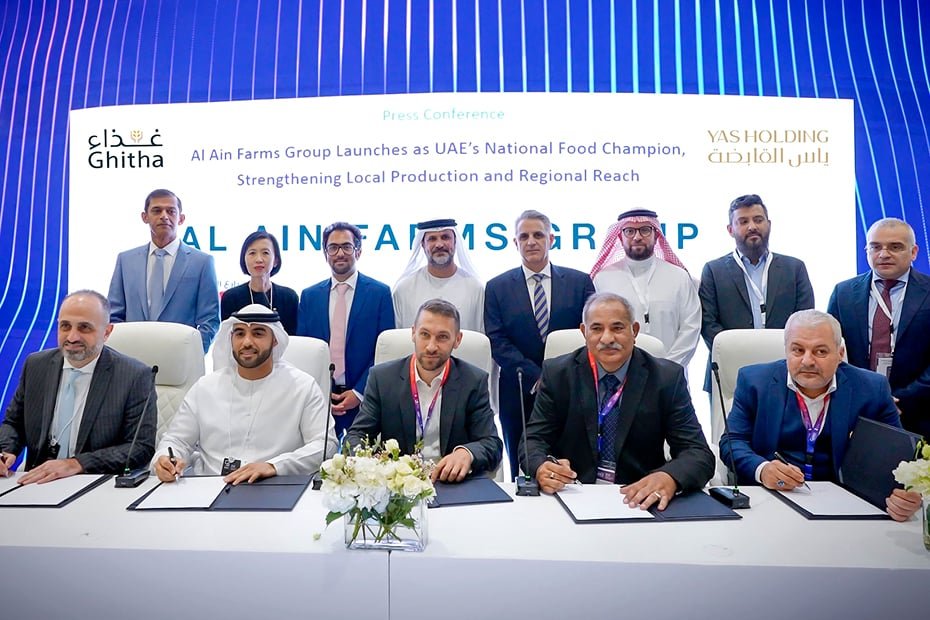Al Ain Farms is not just a food producer; it’s part of the UAE’s national identity. Founded in 1981 by the late Sheikh Zayed bin Sultan Al Nahyan, the company was created to support food self-sufficiency in the desert. Today, more than 40 years later, that mission remains at the heart of what Al Ain Farms does—only now, it’s doing it on a much larger, smarter, and more sustainable scale.
From fresh milk to fruit juice, poultry to dates, Al Ain Farms has grown to become a true ‘National Champion’—a term the UAE government uses to describe companies that are critical to the country’s future development and resilience.
Why food security is a national priority
The UAE imports around 90% of its food. This dependence on global supply chains makes the country vulnerable to disruptions caused by climate change, pandemics, or geopolitical tensions. That’s why food security has become one of the UAE’s top priorities in recent years.

In 2018, the government launched the UAE National Food Security Strategy 2051. The goal is clear: to become one of the most food-secure countries in the world by investing in local production, modern farming techniques, and sustainable practices.
This is where Al Ain Farms plays a critical role.
Al Ain Farms UAE food future: Built on innovation

One of the things that sets Al Ain Farms apart is its use of modern technology to boost food production. The company has embraced smart agriculture practices such as automated milking systems, precision irrigation, and real-time quality control systems. These technologies not only increase efficiency but also reduce water and energy consumption—two vital concerns in a desert environment.
Al Ain Farms currently operates four key business divisions:
- Dairy: Offering fresh milk, yoghurt, laban, and other dairy products.
- Juice: Producing a wide variety of fruit juices.
- Poultry: Providing fresh chicken and eggs to local markets.
- Camel milk and dates: Promoting traditional UAE staples.
Together, these divisions make Al Ain Farms a key pillar in the UAE’s food system.
Sustainability is more than just a trend
Water scarcity is a major challenge in the region, but Al Ain Farms has implemented sustainable practices that help mitigate this. The company uses water recycling systems and invests in water-efficient cooling technologies. It also sources feed locally when possible and uses organic waste for composting.
In recent years, Al Ain Farms has increased its focus on environmental impact. It has shifted towards cleaner energy solutions and is exploring solar power to reduce its carbon footprint. This aligns with the UAE’s overall goals for a greener, more sustainable future.
Investing in local talent and future leaders
Al Ain Farms is not just about technology—it’s also about people. The company is deeply committed to nurturing local talent. Its workforce includes Emirati professionals trained in agricultural sciences, veterinary care, and food safety. The company also partners with local universities to offer internships and hands-on training for students.
By investing in human capital, Al Ain Farms is helping build a new generation of food security experts who will carry the UAE’s vision into the future.
The road ahead: Ambitious expansion plans
Looking forward, Al Ain Farms aims to double its production capacity over the next few years. New facilities are being planned to expand poultry production and introduce more high-value products like cheese and ready-to-eat meals.
The company is also exploring exports to neighbouring GCC countries, positioning itself as a regional food supplier. This expansion strategy reflects its growing confidence—and the increasing demand for homegrown, high-quality food in the Middle East.
Partnerships that strengthen the food chain
Another important aspect of Al Ain Farms’ strategy is collaboration. The company works closely with local farmers, government agencies, and research institutions to share knowledge and improve farming practices across the country. These partnerships help create a more resilient and interconnected food ecosystem in the UAE.
During the COVID-19 pandemic, Al Ain Farms was one of the few companies able to maintain uninterrupted supply, thanks to its robust logistics network and local partnerships. This resilience has made the brand even more trusted among consumers.
Consumer trust and brand loyalty

For many families in the UAE, Al Ain Farms products are a household name. The brand is known for its freshness, reliability, and adherence to quality. Over the years, Al Ain Farms has built strong relationships with supermarkets, online grocery platforms, and restaurants to ensure its products are always accessible.
The company has also embraced digital transformation, with user-friendly online ordering platforms and real-time inventory management to meet growing demand efficiently.
Al Ain Farms and the UAE’s food security vision
As the UAE moves toward its 2051 food security goals, companies like Al Ain Farms are leading the way. Their ability to innovate, scale, and stay true to their mission of self-sufficiency positions them as more than just a business—they are a strategic asset to the country.
By continuing to invest in technology, sustainability, and local talent, Al Ain Farms is not just meeting today’s food needs—it is preparing for tomorrow’s challenges.
Conclusion: From the desert, a food future grows
The story of Al Ain Farms is a powerful reminder that with vision, commitment, and innovation, even the most unlikely places can become leaders in food production. As global food challenges grow more complex, the UAE’s bold moves in building a resilient food system stand out—and Al Ain Farms is right at the center of this transformation.
In the journey to food security, Al Ain Farms isn’t just keeping pace. It’s setting the standard.
Read More: Investing in UAE 2025: Key Trends Unpacked by Gulf Business Panel













